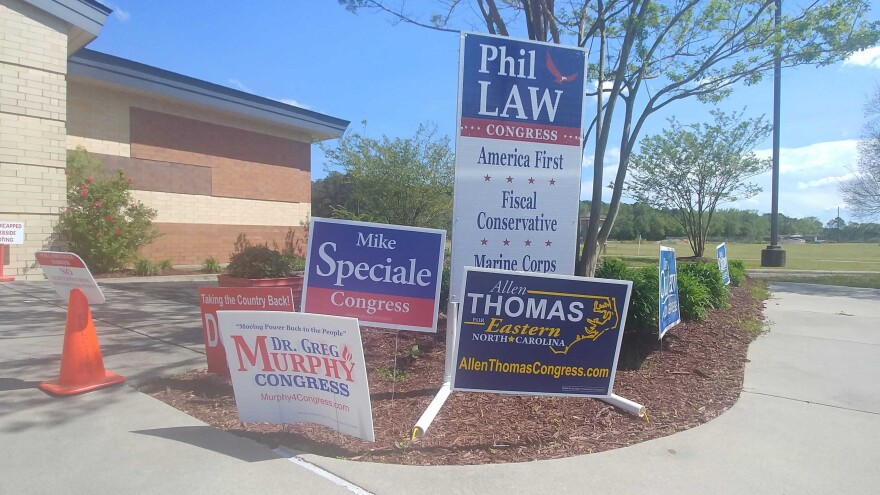Early primary voting concluded Friday in the special election for North CarolinaŌĆÖs Third Congressional seat, made vacant when longtime U.S. House Rep. Walter Jones died in February. More than two dozen candidates are vying to serve the district, which sprawls across much of the coastal plains region, in the upcoming Tuesday primary.
Generally to get from one end of a Congressional District to the other, all you need is a car. However thatŌĆÖs not the case in North CarolinaŌĆÖs Third, where navigating from Topsail to Moyock, requires a boat. The Third is the stateŌĆÖs largest U.S. House district, covering nearly eight thousand square miles. It has voting precincts in 17 of the stateŌĆÖs 100 counties, and itŌĆÖs separated by rivers and sounds.

Issues, What Issues?
Major economic drivers in this region include fishing, farming, healthcare, and the military. There is a varied swath of issues in this special election. Although some voters say those arenŌĆÖt getting enough attention.
ŌĆ£When they start saying, ya know, ŌĆśIŌĆÖm going to be there for TrumpŌĆÖs agenda,' nothing against any of that, but I want whatŌĆÖs good for North Carolina ŌĆō and youŌĆÖre just not seeing that,ŌĆØ said Harold Gray, a resident of Beaufort County, who voted early.
Gray, who spent 34 years in the Coast Guard and Army National Guard, is a registered Republican who supported , one of 17 Republicans seeking the nomination, and among three candidates who has experience in the state House.
ŌĆ£It was a crapshoot, and so I looked at it and he was discussing North Carolina things. And to be honest with you, I donŌĆÖt know anything about the border ŌĆō nothing," said Gray on Murphy's campaign.
Murphy is considered a tenuous frontrunner in this race. He hails from Pitt County, and as the only doctor currently in the state legislature has sought a leading conservative role on curbing the opioid epidemic, and expanding Medicaid.

A Craven Conservative
The district doesnŌĆÖt include any major cities. Population centers include parts of Greenville, as well as Kinston, Jacksonville, and New Bern ŌĆō the largest city in Craven County. Wearing a tan visor, brown open-toed shoes and an enthusiastic smile, Raynor James is touting her candidate of choice, , outside of the Board of Elections. Speciale is also a current member of the North Carolina House, and one of, if not the most conservative, in the primary field. Supported by Tea Party groups. James supports him for what she calls principled stands, occasionally against the wishes of his party leadership.
ŌĆ£The three who have records in the North Carolina House have a leg-up because theyŌĆÖve got a record to point to,ŌĆØ James said. ŌĆ£I think a lot of people have had an experience that is similar to mine and that is, IŌĆÖve listened to people, believed them, voted for them. They get in office and then all of a sudden they change character. When youŌĆÖve seen a voting record that is not nearly so likely to happen. So if you study the voting records of the three who have them, a clear picture emerges if you really look at it.ŌĆØ
But how many people are really going to do that? No public polling is available for this primary. And political observers anticipate that at best turnout will reach the teens.
In addition to Murphy and Speciale, rounds out the state representatives in the field. And there are plenty of others. Currituck County Commissioners and . Lenoir County Commissioner . There is a farmer, pediatrician , veteran who twice ran for this seat and lost, a library technician, and the former Vice Chair of the State Republican Party.
30% + 1
ŌĆ£WeŌĆÖre essentially saying six or seven people at least have a chance of making it into the run-off,ŌĆØ remarked Tom Eamon, political science professor at East Carolina University. In order to advance directly to the general election, TuesdayŌĆÖs primary winner needs 30% of the vote. Like most people following this contest, Eamon expects a primary run-off, which would take place in July, and likely have an even more abysmal turnout. Under that scenario, he says dollars become more important.

ŌĆ£$100,000 would not make a bit of difference in some places, but in this particular area, with low turnout, I think money could make a significant difference in the race.ŌĆØ
With that in mind, remember the name . Three years ago a conservative organization ŌĆō The Club For Growth ŌĆō endorsed Ted Budd, a political unknown in an open Congressional race outside of Greensboro. Thanks in no small part to half a million dollars from that organization, Budd won, and remains in the U.S. House today. As for Cairns, a former CPA who is described on her website as 100 percent unapologetically pro-life, the group backed her last week.







